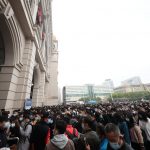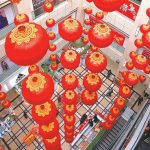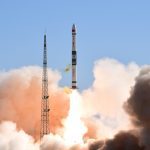One year on, what changed in Wuhan
一年过去了,武汉发生了什么变化

One year on, the city of Wuhan, with a population of 11 million, has emerged from an unparalleled lockdown. The city has fully returned to normal, resuming its bustle and hustle scene, and people are moving on with caution. “The COVID-19 wound will remain with us forever, even a simple reminder is painful,” a resident told the Global Times.
Wear masks, disinfect all that should be disinfected, avoid crowds and stay vigilant about every domestic outbreak, those are habits Wuhan people have kept today, who still cannot let go of aftershocks of pandemic memories. Yet after witnessing western countries’ mishandling of the pandemic, even with Wuhan’s forewarning, people in the city feel grateful for what they have and have become stalwarts of the government’s strict virus prevention measures.
One year has passed, what has changed in Wuhan?
Quite celebration
In the bustling Baishazhou market, Wuhan’s biggest farmer’s market, several conspicuous digital screens warn merchants there: No wild animals and live poultry are allowed to be sold in the market.
One of the screens also welcomes the public to provide tip-offs of any selling of cold-chain products from “qualified sources.”
“The market has stepped up measures in inspecting the selling of frozen products, after news reported several COVID-19 flare-ups were caused by imported cold-chain products. Now with the approaching of Chinese Lunar New Year, such measures are further enhanced,” a Baishazhou merchant surnamed Bai told the Global Times.
Customers, who previously favored frozen meat, now are trying hard to shy away from frozen products, and constantly ask merchants where their products come from. “If the government said eating meat can spread the virus, I think many Wuhan people will become vegetarians forever,” a local resident joked.
A wholesaler who sells frozen beef and mutton said he has not imported any since Wuhan’s lockdown on January 23 last year, and he still has some stock imported from New Zealand and Australia before the epidemic.
“People in Wuhan who have lived through those difficult days know that our current life is hard won. The country has invested so much and local residents have paid so much. We don’t dare to take risks by importing cold chain products,” the owner surnamed Zhang told the Global Times.
Baishazhou’s hustle and bustle makes Wuhan’s many other restaurants green with envy.
Photo shows vendors at the Baishazhou market, the biggest farm produce market in Wuhan, Central China’s Hubei Province. File Photo: Li Hao/GT
Chinese people’s most important festival, the Chinese Lunar New Year, is two weeks away and also marks a peak season for restaurants, where dining together with family members is a celebrate tradition. Yet a Wuhan restaurant manager surnamed Wang told the Global Times that only 40 percent of their tables have been booked. “Previously, 95 percent of our tables would have been booked by this time.”
“Wuhan people’s nerves are still tightly gripped by the pandemic. Not only will we not go out to celebrate Chinese New Year; we stay vigilant every time there’s outbreak in China, such as the one in Shijiazhuang, even if it is thousand kilometers away,” said Chen Xingxu, a Wuhan resident, who also founded a Wuhan-based volunteer group that helped coronavirus patients in the city during the lockdown.
He said some Wuhan residents even started panic buying in supermarkets to stock necessities, after they saw outbreaks in North China, including Hebei and Jilin. “Wuhan people are easily on alert by even a slight sign of trouble now. The bloody scar will remain in Wuhan people’s memory forever, even a gentle touch of it is still painful,” said Chen.
When reporting on the anniversary of Wuhan’s lockdown, the New York Times used the phase “forgetting the pain after a scar heals” to describe the city’s status quo.
Chen gets irritated by such reports, and says the paper’s observation is totally false. “I believe the US has already forgotten the pain while the scar is still bleeding. Maybe they already lost their pain nerve, that people killed by coronavirus in this country has become a new normal.”
Although jolly celebrations of new year is undercut by flare-ups of the coronavirus, Wuhan people are not grudging nor complaining. “After seeing what happened in Western countries, we are so grateful that we can still enjoy life. Being grateful and thankful is what the pandemic has taught Wuhan people,” said Chen.
Wuhan Photo: VCG
Life-changing experience
A year has passed, the barricades that were set up all over Wuhan have long gone, but hygiene habits, such as mask wearing, disinfecting everything that can be disinfected, and avoiding crowds, are still a common practice in Wuhan.
A local taxi driver surnamed Tong told the Global Times that he has been disinfecting his car three times a day after resuming operations in April. “It’s not for me, but also for passengers, for all residents in this city that fought so hard against the virus.”
In today’s Wuhan, although the bustling scenes have resumed, Wuhan people continue their lives with caution, or what they call “moving on with scars.”
Chen, who has travelled to several cities after Wuhan lifted its 76-day lockdown in April, said that Wuhan is not only the city to impose strict virus prevention measures, but its people are the firmest supporters of tough measures in all of China.
Lily Wu, a mother of a two-year-old was struck for an explanation, when her daughter asked if the world was born with people wearing masks, and keeping distance from each other.
“Now on streets of Wuhan, almost 90 percent are wearing masks. People are so scared that a light cough will send people scattering, and we still don’t dare to take the risk of bringing children to crowded places,” said Wu.
She said after life returned to normal in April, she bought a digital camera, which she uses to take picture of her family every day. “Whether it’s a mundane day or a day of joy, I take pictures of my husband and my girl. You don’t know the future.”
Born in Xiantao, another city in Hubei, which is dubbed as the world’s leading mask production base, 45-year-old Zhang Nan (pseudonym) has always dreamed of having a finger in the pie. The outbreak in Wuhan has opened a door for Zhang.
He invested 3 million yuan ($462,828) in this business but the masks his factory produced didn’t meet the standard to be exported overseas. He lost the gamble.
“Some of my friends who lost over 10 million yuan committed suicide. I thought of doing that too,” Zhang told the Global Times.
But later after he witnessed what happened in Wuhan during the lockdown, all the sacrifices the volunteers, social community workers have made; all the pain, the understanding shown by patients in critical situation; all the separations from beloved ones that local residents have gone through, he suddenly felt “life is so precious.”
“What is the meaning of making so much money if your hometown is no longer alive?” he said. Now, as a driver of an online car-hailing platform, he works over 10 hours a day not to get rich, but to pay all debts. “I am reborn like this city,” he said.
People enter a nightclub in Wuhan, Central China’s Hubei Province. Photo: AFP
National unity consolidated
The changes did not dwell only on every Wuhan resident. The government was also motived by the pandemic.
There have been three major changes after the lockdown of Wuhan: recognizing the crisis with strengthened consciousness, taking the responsibilities at each level of governance and following public health guidelines while being responsible to themselves and to others, Wang Hongwei, a professor at Renmin University of China’s School of Public Administration and Policy, told the Global Times.
“Overall civic responsibilities has also been enhanced,” he said.
An official from Wuhan’s health commission, who declined to give her full name, told the Global Times that after the epidemic, the Wuhan government did serious reflection on bettering the city’s public health system. The most important thing would be to value public health experts’ advice.”
The official said the government has received and consulted many renowned experts on treating the disease, including providing traditional Chinese medicine for mild symptoms and recovered patients.
The government is also ready for a fast response to any possible lapse that could lead to infection, said the official, giving an example of Wuhan’s strict management of cold-chain products and quarantine measures of people from medium- and high-risk areas.
When looking at the Western countries’ mishandling of the pandemic, the official also said that another important reason for their failure is that “they don’t have people strictly following the government’s guidelines like we do.”
Chen said at the beginning of outbreak, he despised Wuhan local officials as he felt they were incapable, do-nothing and stone-hearted bureaucrats who caused this gruesome catastrophe.
However, “the more we worked with them, the more we began to see their different side.”
“Over time, we came to know people like the deputy district commissioner in Wuhan who answered our call at 4 am to arrange a hospital bed for a patient… We came to know the Health and Wellness Committee officials who worked until 11 pm to deliver the PCR test results for patients we helped. We came to know the leaders of the Disciplinary Supervisory Committee’s steering group who were on 24-hour standby just to answer our requests. We came to know countless ordinary civil servants who moved mountains to find ways to solve problems and support us,” Chen recalled.
After witnessing the West’s failure of quelling the virus, several Wuhan residents gave credit to the Wuhan government. “We were dealing with an unknown virus, while Western countries fought their battles after we cleared the mist surrounding the enemy. But now, we won, they have lost,” said Zhao Lin, a student from a Wuhan university.
“Now I think our government and system have played important roles in fighting the virus,” said Chen, noting that a few years ago, he would feel ashamed to say such a thing, “because it sounds like slogan.”
The night Wuhan finally lifted its 76-day lockdown, Chen gazed at Wuhan’s dark sky, which was illuminated by a light show of celebration, and joined the countdown of the bell tower to greet the historic moment.
“Our generation was brought up with heroic stories of national heroes who sacrificed themselves for the country. I didn’t buy into those stories before, they seemed too fanciful to be true.”
But after participating in the fight against COVID-19, Chen said that he found that “we Chinese have strong national cohesiveness, which was hidden in the travails of daily life.”
“Now the pandemic has taught Chinese people a good patriotic lesson, awoke our recognition for the country and for our nationality,” said Chen.








